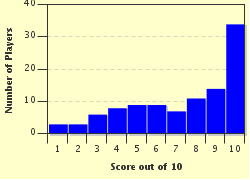Quiz Answer Key and Fun Facts
1. Genesis 27 tells of Isaac being old and apparently frail and being deceived by his son who had made his arms hairy like those of his older brother. Who was the man who made himself hairy so he could deceive Isaac?
2. According to Numbers 6, Nazirites were people who made a special vow to serve the LORD and during their period of commitment, they were not permitted to cut their hair. Scripture goes on to say they must come from Nazareth, hence the term Nazirite.
3. 1 Samuel 19:13 tells of a wife of David helping him escape through a window and then taking an idol and after putting it on a bed she covered it with a garment and put some goats' hair at the head. According to Scripture, King Saul's men who who were pursuing David saw the idol with the goats' hair and they were tricked into believing it was David. Who was the wife of David who apparently saved his life with the ruse?
4. According to 2 Samuel 14:26, a man cut his hair once a year because it became too heavy for him. The same verse goes on to state that after he cut his hair, he would weigh it and "its weight was two hundred shekels by the royal standard," or about five pounds? Who was the man with all the hair?
5. In Proverbs 16:31 in the NKJV, gray hair is described as "a crown of glory if it is found in the way of righteousness."
6. In a book in the Hebrew Bible, or the Old Testament of the English Bible, a woman's hair is likened to "a flock of goats descending from the hills of Gilead." In what book do you find the description as per the NKJV?
7. Matthew 5:36 quotes Jesus, in the NKJV, as stating: "And do not swear by your head, for you cannot make even one hair white or black." The verse is part of what discourse by Christ?
8. Luke 12:7, in the NKJV, quotes Jesus, as making the following statement: "Indeed, the very hairs of your head are all numbered. Don't be afraid; you are worth more than many sparrows." Who did Jesus make the statement to?
9. John 12:3, in the NKJV, tells of a woman taking about a pint of expensive perfume and pouring it on Jesus' feet. The same verse states the woman then wiped Christ's feet with her hair. Who was the woman?
10. The writer of one of the books in the New Testament makes the following statement about women and their hair: "...that the women adorn themselves in modest apparel, with propriety and moderation, not with braided hair or gold or pearls or costly clothing." Who wrote the statement that appears in 1 Timothy 2:9, as per the NKJV?
Source: Author
Cowrofl
This quiz was reviewed by FunTrivia editor
LeoDaVinci before going online.
Any errors found in FunTrivia content are routinely corrected through our feedback system.

